Search the Special Collections and Archives Portal
Search Results
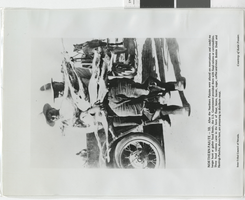
Photograph of food rations being distributed at Paiute reservation, early 1900s
Date
1900 to 1920
Archival Collection
Description
Transcribed from the picture, "Northern Paiute - 10. After the Northern Paiutes were placed on reservations and could no longer hunt or gather food freely, the U.S. Government provided them with food rations or commodities. These food rations came in the form of flour, beans, bacon, sugar, coffee and meat. Bobbie Dodd and Hastings Pancho, shown here, are preparing to distribute meat. Inter-Tribal Council of Nevada. Courtesy of Katie Frazier."
Image
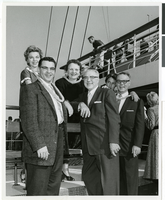
Photograph of Wengert Family members going to Hawaii, 1949-1959
Date
1949 to 1959
Archival Collection
Description
Cyril, Lottie, Ward and Ree Wengert pose with Bob and Marilyn Wengert Gatewood as they travel to Hawaii. They are on a cruise boat outside, wearing leis. This photograph was taken sometime between 1949-1959.
Image
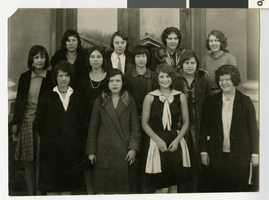
Photograph of the Las Vegas High School library club, Las Vegas (Nev.), 1929
Date
1929
Archival Collection
Description
The Las Vegas High School library club of 1929. Pictured standing in bottom row are, left to right, Arlene Stewart, Laura McDonald, Joy Simon, Eva Adams, teacher. Middle row, left to right are Catherine Deverell, Mary Stockburger, Helen Garner, June Simon. Top row, left to right are Bessie Gregory, Dorothy Buzick, Doris Kramer, Frances Martin. Site Name: Las Vegas High School (Las Vegas, Nev.)
Image
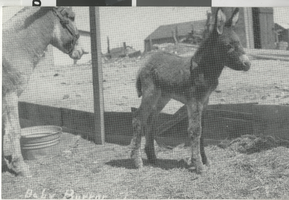
Postcard of a baby burro, Tonopah (Nev.), 1905
Date
1905
Archival Collection
Description
There was an inscription on the image. "The burro was the principal form of transportation used by prospectors in central Nevada at the turn of the century. The prospectors had a love-hate relationship with the animals, which were dependable and well adapted to the desert region, although they could be stubborn and cunning. As the automobile became the accepted mode of transportation, the burros were turned loose and roamed the streets and local trash dumps of the area's towns. They were one of the principal forms of entertainment for local children until they gradually disappeared from the metropolitan areas in the 1920s. The burros that roam Death Valley and the Marietta area of central Nevada today are descendants of those left behind by the prospectors."
Image
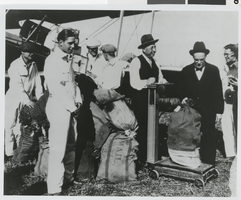
Photograph of first mail flight, Las Vegas, Nevada, 1926
Date
1926
Archival Collection
Description
First mail flight from Los Angeles to Las Vegas. Front left: Maury Graham, pilot; At scales: Harris M. "Pop" Hanshue, founder of Western Air Express, later called Western Airlines. Los Angeles postmaster is weighing mail sacks.
Image
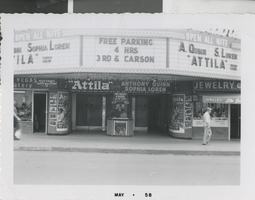
Photograph of the Fremont Theatre marquee advertising "Attila," Las Vegas (Nev.), May 1958
Date
1958-05
Archival Collection
Description
Black and white image of the Fremont Theatre marquee advertising "Attila." The marquee reads: "A. Quinn, S. Loren "Attila" technicolor; Free Parking 4 HRS 3RD & Carson." Another sign reads: "'Attila' starrring Anthony Quinn and Sophia Loren." There are several posters advertising "Attila." Site Name: Fremont Theatre (Las Vegas, Nev.)
Image
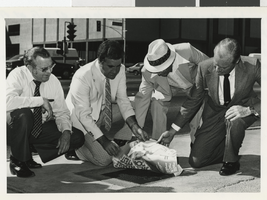
Photograph of John Cahlan and others at Western Airlines plaque, Las Vegas, Nevada, September 23, 1980
Date
1980-09-23
Archival Collection
Description
Unveiling the Western Airlines plaque at the corner of Sahara and Paradise Road, the site of first airport in Las Vegas. L-R: Commissioner P. J. Christensen; Commissioner Ron Lurie; Jubilee coordinator John F. Cahlan; Western Airlines board Chairman Arthur "Art" Kelly.
Image
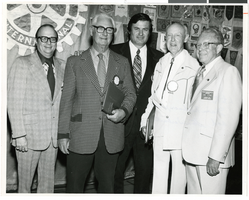
Photograph of Las Vegas Rotary Club members, Las Vegas, Nevada, February 10, 1977
Date
1977-02-10
Archival Collection
Description
Las Vegas Rotary Club members. L-R: Irwin Kishner, Walt Wehrner, Dave Wells, Harvey Luce and Stan Warburton.
Image
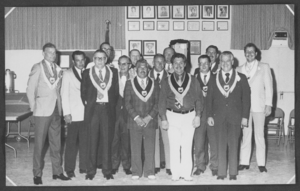
Photograph of North Las Vegas Moose Lodge officers being installed, North Las Vegas, Nevada, circa 1970s
Date
1970 to 1979
Archival Collection
Description
The North Las Vegas Moose Lodge officers being installed, North Las Vegas, Nevada, circa 1970s.
Image
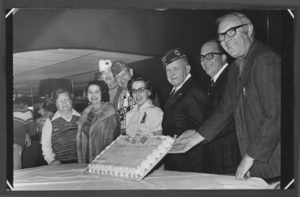
Photograph of North Las Vegas American Legion Post, North Las Vegas, Nevada, March 12, 1974
Date
1974-03-12
Archival Collection
Description
North Las Vegas American Legion Post celebrates, North Las Vegas, Nevada, March 12, 1974. Second from right is Paul May; far right is Gene Echols.
Image
Pagination
Refine my results
Content Type
Creator or Contributor
Subject
Archival Collection
Digital Project
Resource Type
Year
Material Type
Place
Language
Records Classification
